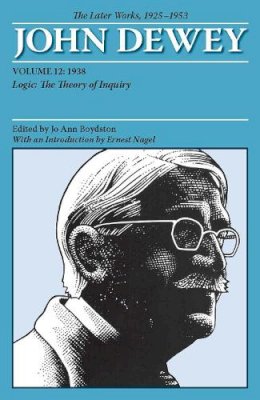
Stock image for illustration purposes only - book cover, edition or condition may vary.
The Later Works of John Dewey, Volume 12, 1925 - 1953: 1938, Logic: The Theory of Inquiry (Later Works of John Dewey, 1925-1953)
John Dewey
€ 64.66
FREE Delivery in Ireland
Description for The Later Works of John Dewey, Volume 12, 1925 - 1953: 1938, Logic: The Theory of Inquiry (Later Works of John Dewey, 1925-1953)
Paperback. Editor(s): Boydston, Jo Ann. Num Pages: 793 pages. BIC Classification: HPCF. Category: (P) Professional & Vocational; (UP) Postgraduate, Research & Scholarly; (UU) Undergraduate. Dimension: 216 x 170 x 47. Weight in Grams: 956.
Heralded as “the crowning work of a great career,” Logic: The Theory of Inquiry was widely reviewed. To Evander Bradley McGilvary, the work assured Dewey “a place among the world’s great logicians.”
William Gruen thought “No treatise on logic ever written has had as direct and vital an impact on social life as Dewey’s will have.”
Heralded as “the crowning work of a great career,” Logic: The Theory of Inquiry was widely reviewed. To Evander Bradley McGilvary, the work assured Dewey “a place among the world’s great logicians.”
William Gruen thought “No treatise on logic ever written has had as direct and vital an impact on social life as Dewey’s will have.”
Product Details
Format
Paperback
Publication date
2008
Publisher
Southern Illinois University Press
Condition
New
Number of Pages
796
Place of Publication
Carbondale, United States
ISBN
9780809328222
SKU
V9780809328222
Shipping Time
Usually ships in 7 to 11 working days
Ref
99-1
About John Dewey
John Dewey (1859 1952) was an American philosopher, psychologist and educational reformer whose ideas have been influential in education and social reform. Dewey was an important early developer of the philosophy ofpragmatism and one of the founders of functional psychology. He was a major representative of progressive education and liberalism. In 1894 Dewey joined the newly founded University of Chicago(1894 1904) where he developed his belief in an empirically based theory of knowledge, becoming associated with the newly emerging Pragmatic philosophy. His time at the University of Chicago resulted in four essays collectively entitled Thought and its Subject-Matter, which was published with collected works from his colleagues at Chicago under the collective title Studies in Logical Theory(1903). During that time Dewey also initiated the University of Chicago Laboratory Schools, where he was able to actualize the pedagogical beliefs that provided material for his first major work on education, The School and Social Progress(1899). In 1899, Dewey was elected president of the American Psychological Association. From 1904 until his retirement in 1930 he was professor of philosophy at both Columbia University and Columbia University's Teachers College. In 1905 he became president of the American Philosophical Association. He was a longtime member of the American Federation of Teachers. The late Ernest Nagel was University Professor Emeritus at Columbia University. Jo Ann Boydston is Director of the Center for Dewey Studies. Kathleen E. Poulos is a staff member at the Center for Dewey Studies.
Reviews for The Later Works of John Dewey, Volume 12, 1925 - 1953: 1938, Logic: The Theory of Inquiry (Later Works of John Dewey, 1925-1953)
